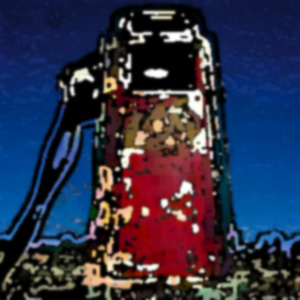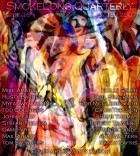I sit on the toilet, my feet propped on the basin of the bathtub. I paint my toes a shade of red called Glass Heart. I bought it because of the name, because someone has the job of naming nail polish colors. She takes indistinguishable shades of red and gives them personalities. Vixen and Cherry are the same shade of red, meant for two very different girls.
There are moths on the window beside the toilet. They are all the same shade: the milk of bones, pale mushroom, dandelion fur.
I am late meeting my father for dinner. I pull the straps of my heels over my toes so they don’t smudge the polish, and I walk out the door. The gaslight comes on as soon as I start the car. I am ten minutes late. My father is already there, ordering a glass of water and wondering if he should try a beer. I imagine him looking up at the door each time it opens to see if my hair is still black, if I have removed the piercing from my lip, if I have stopped being a woman and turned back into a little girl.
I make it there, and see my father sitting at a table reading a menu. The waiter waves when I walk in. I pretend not to see him. He has seen me climb up on the bar, take a shot of tequila, walk the length of it like a stripper toward another shot waiting at the other end.
“Hi!” the waiter says. I think his name is Brian.
“Hello,” I say. I am two people. Brian would say my toes are painted Vixen, and my father would insist that they are Cherry.
We order, and my father sighs as if he is relaxed. “So, any news on when you are going to graduate?”
I take a sip of my beer and let the foam fizz on my lips for a minute before I say, “I don’t know. Maybe next spring?”
“Have you stuck with a major yet?”
“Dad, I’ve been a philosophy major for six years,” and then I realize that for once, I have actually stuck with something for too long.
“What kind of job do you expect to get with a degree in asking questions?”
I want to say, “what kind of answer do you expect to get by asking a question like that?” but instead I say, “my advisor says that the FBI and police seek out philosophy graduates because they are trained in logic.”
“You want to be a federal agent? Or a cop?”
“No,” I say. I gulp more beer. I don’t even like beer, but if I order a Jack and Coke in a tall glass, shaken in ice, but poured without any, then the bartender will know I am here.
“Your mom said you dropped another class,” he says.
“They refunded your money.”
“Thinking is not rewarded in our society. Doing is.”
“So, you’re angry because I didn’t do my class on thinking which you consider invaluable anyway. Makes sense.”
“I’m angry because you never finish anything you start. You could be a lawyer with your ability to argue.”
I set my empty beer glass down on the table and smile. I wonder if he is thinking of the private rehab he put me in when I was seventeen. I submit Exhibit A as evidence of something I started and didn’t quit.
“All I want is for you to be happy,” he says, resigned.
“I am happy, Dad. You can’t believe I am happy unless I’m doing what you think I should do.”
“What makes me happy is you being happy,” he says.
Happy begins to sound like a non-word, one made up to describe a shade of red meant for a woman who is afraid to take off her shoes.
Afterwards, I pull into the filling station across the street. Three men leaning against the store watch me without looking at each other. Another man is at a payphone. He has a red bandana tied around his head, and his yellow Ford Focus is running beside him. The sign that hangs over the filling station is also yellow, the same garish shade, and reads, “Compare Our Cigarette Prices!” Compare to whom? To everyone else?
The numbers on the pump roll over what I normally pay for a tank, and I think how lucky I am to have made it to the restaurant. And then my feet are wet. Gasoline is pouring from the pump and onto my feet. I yank the pump out of the tank and drop it back on the handle. It clangs loudly, and I look up and see the men laughing at me. I smile back. I cannot tell whether the gasoline is burning my feet, or if I am just imagining that it should.
The store is too bright. I have to squint. The cashier is a man whose face has been badly burned. It is burned like someone set him on fire, on purpose. I look at him directly in the face because I don’t want him to know I feel guilty for thinking my feet were burning.
“Your pump out there isn’t shutting off automatically,” I tell him.
“Oh,” he says. Maybe he does not understand me.
“I have gasoline on my feet.”
“Okay,” he says.
Outside, on the window, there are moths on the glass. Some of them are still, their wings folded into their bodies. Some of them are fluttering frantically, their bellies tapping the glass. I understand this language, though I cannot speak it. They want to burn without ever having to touch fire.
The man with the red bandana walks by the racks of candy bars and bubblegum. In one movement, he makes a fist and thumps it against the window, scattering the moths into the darkness, but they come back and beat on the glass.



 The core workshop of SmokeLong Fitness is all in writing, so you can take part from anywhere at anytime. We are excited about creating a supportive, consistent and structured environment for flash writers to work on their craft in a community. We are thrilled and proud to say that our workshop participants have won, placed, or been listed in every major flash competition. Community works.
The core workshop of SmokeLong Fitness is all in writing, so you can take part from anywhere at anytime. We are excited about creating a supportive, consistent and structured environment for flash writers to work on their craft in a community. We are thrilled and proud to say that our workshop participants have won, placed, or been listed in every major flash competition. Community works.